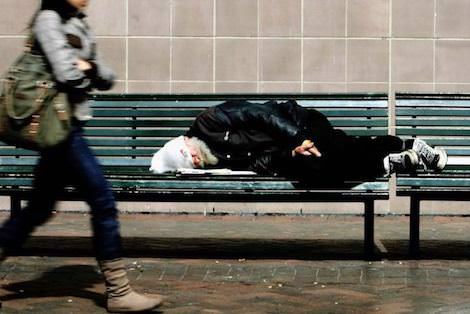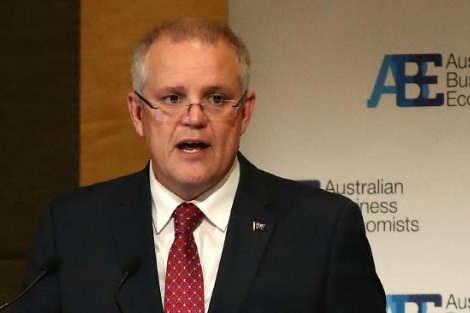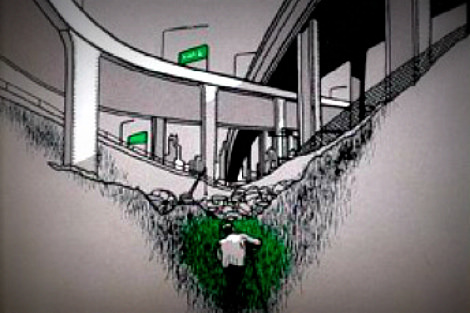Keywords: Debt
There are more than 200 results, only the first 200 are displayed here.
-

RELIGION
- Andrew Hamilton
- 04 October 2017
9 Comments
A Jesuit priest who has worked for over 30 years in India with the poorest villagers, Tony Herbert grapples with three questions: what to make of poverty, what happens when you commit yourself to people who are indigent, and how, in living, the three aspects of poverty - religious poverty, material poverty and its injustices, and personal emptiness - come together. He builds his reflections around encounters with villagers on his own journey.
READ MORE 
-

ECONOMICS
- Andrew Hamilton
- 16 August 2017
18 Comments
Cometh the hour, cometh the third murderer. So now inequality is in the spotlight and is being booed off the stage. It is blamed for the rise of populist politics, and more fundamentally for economic stagnation. The economic neo-liberal orthodoxy, that so implausibly claimed that economic competition unfettered by government regulation would benefit all of the citizens, has produced the gross inequality that hinders economic growth.
READ MORE 
-

ARTS AND CULTURE
- Megan Graham
- 16 August 2017
One lone man daring to interfere with the evil plans of the rich and powerful: it’s not exactly a new angle, but there are a few scraps of satisfaction to be found in Joel Hopkin’s latest film Hampstead – just not in the realm of originality. It’s a sleepy story that meanders along with a mildly pleasant mediocrity.
READ MORE 
-

ECONOMICS
The daily fluctuations of financial markets and the fractious debates over economic policy are concealing something deeper and much more disturbing. The future of money itself is in question. A decade after world banking almost collapsed in the global financial crisis, the questions raised have not been answered.
READ MORE 
-

RELIGION
- Frank Brennan
- 03 July 2017
There is no point in proceeding with a referendum on a question which fails to win the approval of you, the First Australians. Neither is there any point in proceeding with a referendum which is unlikely to win the approval of the overwhelming majority of the voting public, regardless of when they or their ancestors first arrived in Australia. Given that you Indigenous Australians have spoken strongly through your representatives at Uluru in support of a First Nations Voice, it is now for the Referendum Council to recommend to government a timetable for constitutional change with maximum prospects of a 'Yes' vote.
READ MORE
-

ECONOMICS
One of the more interesting recent developments in finance has been the creation of Bitcoin and other crypto-currencies. They are being touted as a revolution in how we think and use money. Alternately, there are many who want to go in the opposite direction, back to the gold standard. Both sides have a common enemy: money whose value is determined by government dictate. Allowing governments to dictate in this way, they argue, is the core of the problem. To a significant extent, they are wrong.
READ MORE 
-

ECONOMICS
The $6.2 billion the government will raise through a levy on bank liabilities not only shows how out of favour banks have become, it is also, in effect, a de facto tax on property lending - a counterbalance to negative gearing and capital gains tax breaks. It is a tax on property lending because nearly all the banks' loans are mortgages for housing, or business loans secured with property. Of course the banks will pass the extra cost on to their customers, so it becomes a tax on borrowers.
READ MORE 
-

RELIGION
- Frank Brennan
- 08 May 2017
1 Comment
Our Church is presently a strained, outdated social institution with an exclusively male hierarchy and clergy. But it is also the privileged locus for us to be called to the banquet of the Lord sharing theology and sacrament which have sustained the hearts and minds of similar pilgrims for two millennia. Thank God for Pope Francis who is showing us the way, helping us to find meaning in our changing and chaotic world, putting a fresh spring in the step of all those Catholics holding in tension the prophetic and the practical, the theological and the humanist, the tradition and the contemporary reality.
READ MORE
-

AUSTRALIA
- Frank Brennan
- 07 May 2017
7 Comments
Part of the cost of the double dissolution election last July has been the creation of a Senate with the largest, most diverse group of crossbenchers ever. This will make the passage of any new contested Budget measures difficult, particularly given the Prime Minister’s vulnerability on his right flank, and the Labor Party's propensity to mimic the Opposition tactics adopted previously by Tony Abbott. The government needs to create a clear narrative as to how it will achieve equitable and sustainable growth through this Budget.
READ MORE 
-

PODCAST
Is there such a thing as bad debt when it comes to national budgets? Is infrastructure spending a great idea by default? We also take a glance at the first 100 days of the Trump presidency. As an antidote, we finish with a quick reflection on the latest moves by Pope Francis.
READ MORE
-

AUSTRALIA
- Tim Robertson
- 20 April 2017
13 Comments
One of the challenges for progressive parties is to look beyond the existing neoliberal framework for solutions to the current malaise. Labor is so steeped in neoliberal orthodoxy that, even if it was willing to evolve, it's likely incapable of doing so. And while much of the intellectual heavy lifting in forming a picture of what a post-neoliberal future may look like will be done outside organised politics, Labor remains completely unengaged with almost all of these debates.
READ MORE 
-

AUSTRALIA
- Francine Crimmins
- 14 April 2017
15 Comments
As a millennial, I frequently find myself being told to stop complaining about housing affordability. It's all about working harder, saving more and, for goodness' sake, keeping off the avocado. As a young person, I'm concerned about using super, a system which was put aside for our economic welfare in retirement, as a savings account for instant gratification. The government is trying to solve the housing crisis not through direct action, but by encouraging young people into lifelong debt.
READ MORE 